Sunday, February 26, 2006
February Open games
The Almeida game (my other loss from December) is turning out to be hard to finish annotating. In the meantime Here's my games from the February Open, with very light notes.
 Here, playing Black, I missed an important idea for White. Black to play: Find the wrong move!
Here, playing Black, I missed an important idea for White. Black to play: Find the wrong move!
Saturday, February 25, 2006
Finally, I post a game!
As I mentioned before, I'm trying to do my first analysis of my games without a computer now, and it's been taking a while. I have analysis for my two losses in the Marshall Championship in my notebook, and today I put my loss to IM Jay Bonin into my database and checked it with Crafty.
The results were pretty dismaying--I missed a lot of tactics even in my analysis. On the other hand, Crafty confirmed some of my intuitive impressions (which I thought my analysis had proven wrong).
Anyway, here's the Bonin game for your viewing pleasure. Comments welcome, as always.
I hope to have analysis of my other loss from the Championship up by the end of the weekend, and at least light notes for the games from my last tournament sometime this week. I'm playing again next weekend, deus volent, so I'll be falling further behind after that.
Monday, February 20, 2006
Construction Tasks
Ever try to construct a position that met some extreme set of criereria? Last week, a poster on one of the Usenet chess groups asked about the rule that a position where no sequence of legal moves can result in checkmate.
One question was what the smallest amount of material is, such that the position is not stalemate and there is enough material to mate, but no mate is possible by legal moves.
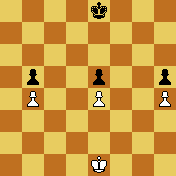 I came up with two types of position. Here's one where six pawns are enough to block the King's each on his own side of the board.
I came up with two types of position. Here's one where six pawns are enough to block the King's each on his own side of the board.
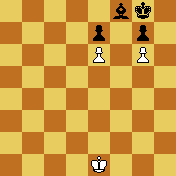 The next one has one fewer piece, but the presence of a minor piece makes it "more material" in some sense.
The next one has one fewer piece, but the presence of a minor piece makes it "more material" in some sense.
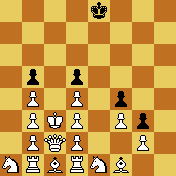 The next question was, what's the biggest material imbalance for which no mate is possible? In this one, the whole army is bottled up by four pawns! But unfortunately it's illegal, since the White h-pawn was transported somewhere by authorial fiat.
The next question was, what's the biggest material imbalance for which no mate is possible? In this one, the whole army is bottled up by four pawns! But unfortunately it's illegal, since the White h-pawn was transported somewhere by authorial fiat.
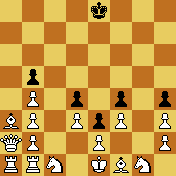 This one, however is legal, although Black has one more pawn.
This one, however is legal, although Black has one more pawn.
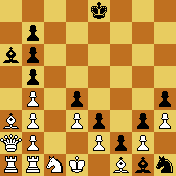 I've spent a little time this weekend trying to do the next logical task--the most total material with no possible mate. Here's the best I've done so far.
I've spent a little time this weekend trying to do the next logical task--the most total material with no possible mate. Here's the best I've done so far.
These are the kinds of things I see in troubled dreams.
If anyone can come up with better solutions for these construction tasks, let me know.
Still no games?!
As usual, things are going more slowly than I anticipated. I have finished annotating my losses from the Marshall Championship, but I still have to type them into SCID and then blunder-check the analysis. The games from last week's tournament aren't even in SCID yet.
Friday, February 17, 2006
Goniff on the Loose
Busy, busy! I played the monthly slow open at the Marshall last weekend, with a really good result, two wins and two draws for a 2300 performance. One of the draws was against IM Jay Bonin. I'll put some stuff up this weekend.
I'm not ready to give any credit to my new training methods. For one thing, it's way too early; for another, I didn't play as well as the score indicates. I missed some important tactics, and could easily have had an even score instead of +2.
Still, any tournament where I don't lose to Jay is a good tournament, and I was in fine Goniff form, hanging on after the mistakes and dragging wins out of even endgames.
Friday, February 10, 2006
Where I've been, and a review of Chess For Zebras
Since the start of the year, I've been working long hours again. When I'm doing that, I don't like turning on a computer when I'm at home. Also, I decided that analyzing games with the help of a computer engine was not helping me that much, and that when analyzing on the computer, there's too much temptation to turn on an engine "just to check for blunders".
For these reasons, I'm doing my chess work with a board and pieces, and pen and paper. But not having the computer on at home means no blogging. I will try to post a little more often, though.
I had forgotten how much slower it is to analyze using a real board, and having to write down all the lines. I have pages of analysis on just one game from the Marshall Championship. Eventually, I'll put it all into SCID and then pare it down to post it here.
Chess For Zebras
At Christmas I got a copy of Jonathan Rowson's Chess For Zebras, which has been getting a bunch of interesting reviews, each of which seems to concentrate on different aspects of the book from the others. Here's my short take, based on my own specific concerns.
Rowson is a very entertaining writer, and some of the things he says about the advantages (and disadvantages) of having White are quite thought-provoking. However, I'm mostly interested in books that can improve my play, and Rowson says some important things about improvement as well.
I've often heard it suggested that it's basically impossible for an adult player to improve much, especially if he's already a strong player. I always thought this was nonsense: I'm still getting better at other things; I'm a better programmer now than I was five years ago, and was better ten than I was ten years ago, for example. Why should improving at chess be different then anything else? Rowson continues:
This makes sense to me; after all, improvement in other areas is mostly about improving skills: learning the basics of a new programming language, for example, is mostly about writing small test programs, and imitating examples found in books or on the web, until the new languages way of doing things becomes your natural way. In other words, a little learning and a lot of practice.
In a footnote, Rowson adds:
However he agrees with Ken Smith's advice about the predominant importance of tactics at lower levels:
which should be good news to the Knights Errant. I think the 1800 cut-off is probably well chosen; based on my experience, I don't expect that players much above that level will get as much out of intensive tactical training.
In the chapter "What to do when you think there is a hole in your bucket" (and how can you not love a book with chapter titles like that!), he quotes GM Nigel Davies:
What it all adds up to is to structure your study time to concentrate on problem-solving: doing exercises from books and playing over games "solitaire-chess" style (analyzing each position) being the obvious approaches.
A worthwhile book.
Training plan
So, I'm currently working my way through Silman's _Reassess Your Chess Workbook_, which I picked up at a library book sale. I'm also finishing up _Dvoretsky's Endgame Manual_, which is structures so encourage treating each diagram as a problem. After that, I also found one of the Dvoretsky "School of Chess Excellence" books at a used-book store, and I'll work through that. I still have my own games to analyze, and if that doesn't fill up all my study time, I'll do the "solitaire-chess" thing on one of the annotated games collections I own.